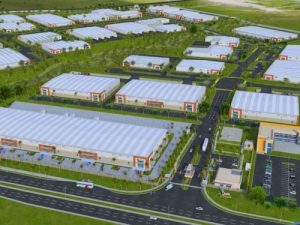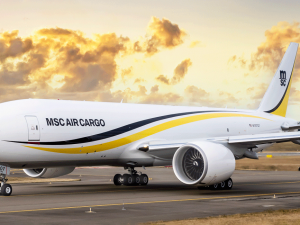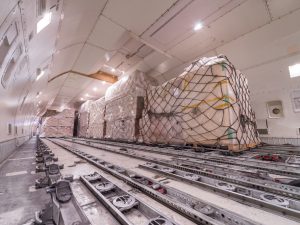Air France KLM Martinair Cargo (AFKLMP Cargo) has partnered with Salesforce and Vonage to implement a new Customer Relationship Management (CRM) solution and improve customer services. By implementing the new single-platform CRM solution, integrated with a contact centre solution, AFKLMP Cargo aims to streamline customer processes and provide faster, better service by phone and digital channels, with more tailored support. Using technology from Salesforce and Vonage, customer service teams get a full 360-degree view of customers, allowing them to personalise interactions and provide tailored support across all channels. The full solution includes integrated telephony and AI-driven insights designed for an improved omnichannel service experience.
Read More »NAP strengthens its air cargo logistics platform
Neutral Air Partner launched its new air cargo logistics ecosystem with six sub-industry networks during its annual OPENAP conference last May in Greece. This year, NAP has reformed and strengthened its air cargo logistics platform, enabling members to network more efficiently with six sub-industry networks. The new structure provides air cargo logistics firms with the opportunity to apply for membership in a sub-industry network tailored to their specialization and the company’s core industry sector activities. Membership in Neutral Air Partner is an exclusive privilege extended to a selected number of elite local and regional airfreight professionals. Selection criteria ensure only the most suitable partners with niche-specific expertise are part of the network.
Read More »India Cargo Awards is back @ 24 July, 2023
India Cargo Awards 2023 is back to honour and appreciate the hard work of the ‘Heroes’ of the Indian Air Cargo and Logistics fraternity. Known as the “Oscars of the Cargo Industry,” the India Cargo Awards 2023 is all set to be held on 24 July 2023, 7 pm at Hyatt Regency, New Delhi. The annual awards hosted by Cargo Talk (DDP Group Publication) serves as an all-India platform created with a vision to recognise excellence in the Cargo-Freight-Logistics Industry across various domains, including Rail, Road, Air, Sea, Allied Services, Warehousing, Technology, 3rd Party Logistics, and more. Our world-class awards ceremonies are known for their formal Black-Tie affair, filled with glitz and glamour, attended by the most influential personalities in the Cargo Industry.
Read More »Lufthansa Cargo receives third A321F
Lufthansa Cargo announced the arrival of its third A321F, which took its first flight “on our routing from Malta to Milan, and was welcomed by our customers and colleagues on site,” says a LinkedIn post. The A321 was based in Singapore over several months, and underwent conversion from passenger to freighter aircraft, a so-called A321P2F (passenger to freighter version), the post added. “Now, 14 pallet and container positions are available to our customers in the main deck and 10 in the lower deck. This results in a total payload of 28 tonnes with a range of 3,500 kilometres. The transfer flight from Singapore took the aircraft via Bangkok, Muscat, Larnaca, and Munich.” The aircraft with the registration D-AEUI and name Dia dhuit Ireland will join two A321F freighters – Merhaba Türkiye and Hello Europe – and will contribute to the expansion of e-commerce offering in the European route network. “This route is one of our shortest freighter routes but of great value for Malta as it opens up new markets to the small island,” says Antonio Di Martino, Director, Sales & Handling Italy & Malta, Lufthansa Cargo. “After two months of frequencies, we are pleased with the development and see a lot of vulnerable and dangerous goods but also live animals on this routing. We are glad our A321F fleet is getting stronger with an additional freighter.
Read More »MNG Airlines receives first A321P2F aircraft
ST Engineering redelivered the first of the two A321 Passenger-to-Freighter (P2F) aircraft placed on lease to MNG Airlines, in a joint venture with Juniper Aviation. After several months of conversion, MNG Airlines’ first A321P2F called TC-MYA finally took off today morning from Singapore. “With a gross load capacity of approximately 28 tonnes, we are looking forward to our aircraft offering less emissions,” stated MNG Airlines. A.Sedat Ozkazanc, CEO, MNG Airlines says, “We are excited to complement our existing widebody fleet with this Airbus A321P2F narrowbody freighter and look forward to adding another one in the near future. This addition makes us the world’s first airline to operate all previous and current Airbus freighter programmes. This aircraft type also represents the epitome of our environmental commitments.” With the addition of this freighter aircraft, MNG Airlines will now enjoy the benefits of an expanded Airbus freighter portfolio comprising both the narrowbody A321P2F and widebody A330P2F platforms.
Read More »Haryana to set up MMLPs in Palwal and Ambala
To enhance the logistics infrastructure, the Haryana government is in the process of identifying two land parcels in the Palwal district and one in the Ambala district to set up three multimodal logistics parks (MMLPs) on public-private partnership (PPP) model under the national corridors’ efficiency improvement component of Bharatmala Pariyojana Highways projects, said reports. “This initiative will significantly enhance the logistics capabilities of the state, driving economic growth and attracting investments. The government is establishing a robust infrastructure network to support the logistics industry,” added reports.
Read More »MSC Air Cargo, IBS sign pact to boost cargo efficiency
MSC Air Cargo has signed a multi-year agreement with IBS Software to achieve continuous efficiencies for air cargo operations. “We will continue exploring avenues to develop MSC Air Cargo in a way that complements MSC’s overall solutions to our customers. This is why we’ve engaged IBS Software in a strategic agreement to implement their industry-leading iCargo platform,” says Jannie Davel, SVP, Air Cargo, MSC in a LinkedIn post.
Read More »Cainiao Group, AliExpress unite for cross-border deliveries
Cainiao Group and online retailer AliExpress are partnering to launch a five-day global delivery service for cross-border packages. The company would achieve the new service through “full-chain operational optimisation and streamlining of workflows across first-mile pick-up, line haul, overseas distribution, and last-mile delivery,” said official release. The new service will bring a 30% uplift in delivery speed compared to the industry standard, the logistics firm said. Wan Lin said, “The next decade will unveil new development opportunities for smart logistics, and Cainiao will dedicate our efforts to building a leading global smart logistics network. This includes establishing three long-chain logistics networks encompassing domestic logistics, cross-border logistics, and overseas logistics, as well as creating three short-chain businesses in last-mile post stations, logistics infrastructure, and logistics technology. The goal is to provide quality and competitive logistics services to our consumers, merchants, platforms, and logistics partners.” The company will also target overseas markets with a focus on key logistics nodes in Europe, North America, and Southeast Asia, specifically with a target to establish one to two local warehousing and distribution centers each year.
Read More »APAC air cargo demand continues to suffer in May: AAPA
Asia Pacific air cargo business continues to suffer in May from “subdued demand conditions, driven by weak business confidence levels”, according to the Association of Asia Pacific Airlines (AAPA). Preliminary air cargo traffic figures for May showed that in freight tonne kilometres (FTK) terms, air cargo demand fell by 7% year on year in May. Offered capacity rose by 6%, leading to an 8.5 percentage point decline in the average international freight load factor to 60.1% for the month. Subhas Menon, AAPA director general, said, “Air cargo demand remained soft, reflecting the prevailing weak global economic conditions and in particular, the slowdown in the manufacturing sector. He added, “Trade tensions are likely to weigh down on cargo markets for some time to come whereas air travel demand is expected to demonstrate resilience in spite of the headwinds in the external environment.” The AAPA said that international passenger markets continue to grow strongly amidst the restoration of flights in the region, resulting in increased belly capacity.
Read More »‘Air connectivity, wide-body aircraft capacity vital’
The availability of air connectivity and wide-body aircraft capacity, be it to domestic or international destinations, is vital for the growth of the air cargo industry, says Kiran Jain, Chief Operating Officer at Noida International Airport (NIA). Utilizing wide-body aircraft can offer increased cargo capacity and cost-efficiency advantages, especially for long-haul and high-demand routes. While factors such as infrastructure limitations, operational costs, and market demand may influence the feasibility of wide-body aircraft deployment, some cargo operators have incorporated wide-body aircraft into their fleet to meet specific cargo requirements. In addition to air connectivity, road, and rail connectivity also play an important part for last mile connectivity and cannot be overlooked in building a robust logistics ecosystem.
Read More » Cargo Breaking News
Cargo Breaking News









